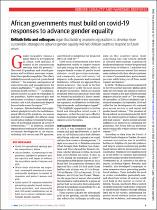African governments must build on Covid-19 responses to advance gender equality
| dc.contributor.author | Bello, Kéfilath | |
| dc.contributor.author | George, Asha | |
| dc.contributor.author | De Jong, Michelle | |
| dc.date.accessioned | 2023-06-20T07:26:00Z | |
| dc.date.available | 2023-06-20T07:26:00Z | |
| dc.date.issued | 2023 | |
| dc.identifier.citation | Bello, K. et al. (2023). African governments must build on Covid-19 responses to advance gender equality. BMJ (Clinical research ed.), 381, e072239. 10.1136/bmj-2022-072239 | en_US |
| dc.identifier.issn | 1756-1833 | |
| dc.identifier.uri | 10.1136/bmj-2022-072239 | |
| dc.identifier.uri | http://hdl.handle.net/10566/9120 | |
| dc.description.abstract | Gender inequality remains a major threat to development in Africa, with millions of women in the continent not reaching their full potential.1 The covid-19 pandemic and related quarantine and lockdown measures exacerbated these gender inequalities. The effects included increased reports of gender based violence,1-4 the economic consequences of reduced income and unemployment for women and families,5-13 and disruptions to essential health services.14-17 In addition, school closures as a part of responding to the pandemic, further exposed girls and adolescents to violence, unintended pregnancies, and a risk of permanent dropout from schools across the region. | en_US |
| dc.language.iso | en | en_US |
| dc.publisher | NLM (Medline) | en_US |
| dc.subject | Public health | en_US |
| dc.subject | Covid-19 | en_US |
| dc.subject | Africa | en_US |
| dc.subject | Gender studies | en_US |
| dc.subject | Unemployment | en_US |
| dc.title | African governments must build on Covid-19 responses to advance gender equality | en_US |
| dc.type | Article | en_US |

